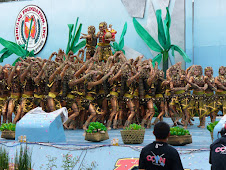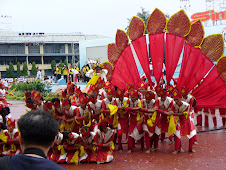Showing posts with label Mendez. Show all posts
Showing posts with label Mendez. Show all posts
Monday, June 18, 2007
OF CACOPHONOUS CICADAS & CONTEMPLATIVE CHANTS
Once more I am revisiting an old journal entry, written three years ago, on the Feast of St. John the Baptist, June 24, 2004. When I wrote this, cicadas made a comeback in the Northeastern portion of the United States. This year, after also 17 years, cicadas are back with a vengeance in the Midwestern portion of the US. I grew up very familiar with cicadas back home in Mendez, Cavite (when it was still heavily wooded, and when life was simpler). I am reposting this entry for posterity.
Cicadas Come and Gone
This year’s (2004) northeastern U.S. seaboard’s weather has been a story of coming and going. Spring went away as fast as it came, bringing relatively warm, wet, and at times, sultry and muggy weather in its place. It was bad for people who engaged in a once-yearly battle of allergic proportions with pollen. The air was sodden with moist pollen all night and all day, bringing in its wake itchy noses, itchy eyes, and icky throats that left a sour note on the optimism of much-awaited spring. The sudden squalls and tornadoes were bad enough. But feeling sick without really being sick, tormented by free-floating pollen could be worse. For all the glories of spring spoken of by romantic poets from both sides of the Atlantic, there were people who were plain miserable as snow melted and buds went a-blossoming.
But as people’s throats itched and their voices croaked, certain critters muzzled silent all these past 17 years, arose from their long slumber, and broke through the muffled sufferings of people just beginning to shed their heavy coats and sweaters. Cicadas, last seen 17 years ago in Maryland, given by mother nature just the right temperature and humidity, rose from their almost two decades of entombment in the soggy ground, and within days, millions of these noisy critters were caught up in a 100 decibel strong constant and organized cacophony, to the delight or disgust, as the case may be, of many people.
The cicadas, though, were music to my ears, even as the unpredictable spring weather, with its rains, thunder and lightning, seemed more like “home” to me. It was exciting to see and hear cicadas merrily booming their loudest, especially for one who last heard cicadas (known as “kagang” in Cavite) back in 1965 in then idyllic Mendez. Having gone beyond the 100 decibel rating, the noise those cicadas made was technically illegal in America. Illegal and generally unwanted and unappreciated by most, their glorious cacophony rang sweetly in my ears, as they brought back carefree, childhood memories of the Mendez, Cavite I still kept in my heart – memories that unfortunately, now run counter to what is current reality, a tree-less, almost barren and brown, once lush countryside, now giving way to the onslaught of unplanned so-called development.
A Flash of Reagan Magic Come Once More and Gone Forever
Reagan’s passing away was characteristic of what, and who he was – the great communicator. He could not have chosen a better time, just when the leaders of the G8 nations were due for a meeting in U.S. territory. Media attention was diverted from the world leaders’ meeting to the week-long farewell fit for royalty. America was as emotional as it could get. More than 200,000 people filed past his bier lying in state both in Simi Valley, California, and in Washington’s capitol building. Millions more were glued to their TV sets, a great many of them unabashedly crying in private or in public. An actor-communicator with a perfect sense of timing, Reagan’s magic flashed and shone once more for eight days, as it did for eight years as President, and for many more as Governor of California, fading away with absolute panache in a mythical and fabled sunset burial by the hills overlooking the Pacific ocean.
Fil-Ams on the Rise: Making Waves in America
The 106th Philippine Independence Day celebrations took place all over America where Filipino-Americans are present. Now officially 2.4 million strong in America (918,000 in California) alone, the many, varied, and disparate groupings of Fil-Ams came up with a series of celebrations to mark Independence Day. I was fortunate to have been present in one such Dinner Gala celebration for Fil-Ams of the Metro Washington, DC area where I delivered the Invocation. J.W. Marriott hotel at 1331 Pennsylvania Avenue became festooned with the trimmings and trappings of a barrio fiesta atmosphere, as dance troupes, singing groups, and rondallas, along with immaculately and appropriately dressed Fil-Ams in indigenous gowns and barongs vied for the best vantage point in the big lobby, prior to the official dinner program.
As the celebrations and merry-making wore on through the evening, it was hard, at least for me, to shake off that nagging thought of how ironic everything was. There we were celebrating independence, while our honorable politicians back home reminded the whole world all too clearly how shackled and fettered the whole Filipino people still are, to an antiquated, and enslaving system of doing politics, to an equally obsolete system of conducting elections, which, I maintain, together with PCP-II, remain as an “expensive and immoral process.”
Filipinos scattered all over the world, now more than 8 million, might be “making waves” in their adopted and adoptive home countries, but our home country, the fabled “pearl of the orient seas,” is fast slipping down the road towards becoming the basket case of Asia, with that structural evil called politics as a primary contributing factor.
Coming and Going: A Story in the Making
The natural order of things in the world of creation is a recurrent cycle of comings and goings, waxing and waning, ebbs and flows, and birth and death, as sure as the sun rises and sets each day. Summer is once more officially in, and the rebirth of spring is now something to look forward to again for next year. The hordes of cicadas are now long gone and an eerie silence now fills what used to be enclaves of roaring, whirring, piercing shrillness. Having tucked their “progenies” in between crags of trees after a three-week-long existence, the cicadas just faded away gradually into the silence of perhaps another 17 year waiting time. The eggs will somehow find their way into the relative warmth and safety of the ground, where they will suck the life out of juicy roots of trees, waiting for the right time and the right conditions to once more strut their hour upon the stage of life at some time in the distant future.
I would like to think that the Philippines, with all its myriad problems and trials, is also an ongoing story of dying and rebirth, of falling and eventually rising once more. Once known as the Switzerland of Asia, envied before by neighboring countries for its level and standard of education, second only to Japan in economic growth in the late 1950s, the Philippines has definitely seen better days. It has had its 15 minutes of fame in the worldwide arena of freedom-loving nations back in 1986, when it peacefully worked for regime change that was believed to be the start of its gradual rise towards its rightful place under the sun.
The few weeks that cicadas roared their way into their noisy existence only to lie hidden once more under the ground for a long, long while seems to be a huge, huge waste. Their ephemeral presence has led many, many people to ask themselves: “Of what use are the cicadas in the order of life as God envisioned it?” Finding no real, concrete practical utility for the millions that serenaded a huge part of Maryland for some three to four weeks all day and all night, existing apparently only to mate and assure the species’ continued presence in the world, people waxed poetic and philosophical and waned pragmatic and utilitarian, for a change.
Cicadas, for all the seeming futility of their short-lived existence, succeeded in teaching harried and hurried people who think that everything must have a practical and useful purpose to ever exist. For one, they made a 48 year old hopeless romantic like me, race back to a time when dragonflies, beetles, and spiders were more than enough to make children happy. Those cicadas made philosophers and pray-ers out of people who have learned to take simple things for granted, who appreciate their handiwork much more than they do God’s own. The cacophony they reveled in for three weeks taught people to listen to the voice of a God who is raring to be heard and paid attention to, a God who remains steadfast despite the waxing and waning of people’s fortunes and personal and collective stories.
The cicadas have come and gone, even as the “grandeur that was Rome’s and the glory that was Greece’s” are long gone now. For those attentive and discerning enough, their story of coming and going is but a reflection of what human life is, “like a flower, here today, but gone tomorrow.” In their temporariness lie their greatness and power. In their glorious cacophony, we find intimations of the contemplative chants of pray-ers and philosophers who realize and understand humbly that “here, there is no lasting city,” and that “the old order must pass away” and give in to the new.
As for me, it was well worth the wait from 1965 to 2004, from Mendez to Maryland, from mischief-maker to an adult, responsible man, to see and understand much more than meets the eye about the relationship between cacophonous cicadas and contemplative chants of worship addressed to a God who knows the ebb and flow of the tides, who is greater than principalities and powers that rose and fell in history, who remains lovingly steadfast and faithful, despite the waxing and waning of people’s loyalties, and whose Son’s dying and rising, is ultimately reason enough for cicadas to go on singing, and people like us to go on hoping.
Labels:
Cicadas,
Hope,
Journal,
Mendez,
Pinoy in the US,
Pinoy Travelogue
Monday, June 11, 2007
MENDEZ IS IN THE HEART
I am revisiting a journal entry I wrote back in June 15, 2002. It has always been my desire to write some kind of an apologia for my hometown, Mendez, Cavite. This original entry copied almost verbatim below had been sent to my friends and readers when blogging was yet light years away from my reach.
I would like to dedicate this piece to all my fellow Mendezenians scattered all over the world. It is no secret that of all the towns in Cavite, probably Mendez has among the most relatively numerous migrants all over the world, in particular, the United States and Canada.
The 10th Sunday of Ordinary time (which fell in the first half of June 2002) did not quite turn out to as be rosy as I would have wanted it to be. I will be straight to the point… I was grouchy. As I was into deep introspection, trying to find out the reason behind the negative feelings that opened my day, the same was further aggravated by commentators at mass who, for the nth time, did not quite get my family name right. Dimaranan, I guess, is long enough, and I don’t need anybody adding another syllable, or two, where he or she pleases – or, for that matter - subtracting, interpolating, exchanging, mixing up or what have you… murdering, it, to cut the long story short. The real issue here is plain lack of functional, passable literacy even among those who claim to be reading and proclaiming the Word of God in church. Why, a good number of them don’t seem to even understand what they are reading. You can sense it from the way they truncate phrases at the wrong places, from the manner with which they group together words and – my goodness, the way they mispronounce even simple words. We might as well ask the ICEL (International Commission of English in the Liturgy) to allow us to introduce a CONIOTIC version for da Pilipins! Now, that would really be exciting! That move would make all our colegialas instant experts in language, and instant reading celebrities in church. How about that? After all, - correct me, if I am wrong di ba it’s like this na, the way they make announcements in Church?
Ipinakikiusap po –lamang na paki turn off lang po ang inyong mga cellphones, o ilagay lamang po sa silent mode, habang nagmamass ang priest… Goodness gracious! At the rate we’re going, Papua New Guinea will soon be replaced by the Philippines as the Pidgin English capital of the world!
But now, back to why I was grouchy… I soon found out why as I was deep in thought. The driver assigned to pick me up, who usually was rather upbeat and jolly, was beginning to pique me. I noticed, as a student of human behavior, that he was taking potshots at all the priests he ever worked for, in very many and subtle ways. Most of the priests he was referring to, of course, were known to me personally. Although I knew that this same fellow would, invariably, be also ribbing others about me in future, I was not perturbed by this. What really pissed me off was when he asked where I was born, and where I grew up. MENDEZ, CAVITE, I said. And that was when he started giving me all the best that his knowledge of social studies could muster. For one who hails from Mindanao, apparently all he knows about Cavite are the usual labels and myths attached to it: matatapang, maraming tulisan, carnappers, etc. An issue that has not been fully resolved in me surfaced once more. I held my cool. I kept silent. Those among you who know me well enough, would know what is behind this, and why I insist on us being a little more considerate by doing away with any type of cultural labels and the like. As a little boy, fresh from the boonies of Cavite, transplanted to a patently different world that was Makati then, (at that time, the only building one could see for miles on end was the DBP building. Behind, or near it was a creek that ran the length of Buendia avenue, along the fringes of the then posh Bel-Air village, where the boys of the neighborhood I was in, would spend hours catching small fishes that I guess were biya fingerlings, or just plain butete. All this done, of course, without permission! Nearby, too, was a muddy hole, a pond – it was a lake for a probinsyano 7-yr old – where we would disrobe and plunge to our hearts’ delight, again unbeknownst to the grown-ups who were busy adjusting to a whole, new brave world that was Poblacion, Makati.) Well, at that time, when teachers and neighbors would refer to Cavite as a place of hoodlums and other shady characters, I just could not understand! My innocent mind simply could not make connections between Cavite and the underworld characters they would be talking about. Mendez was a good-enough place for me. There I was happy. There I saw inherent goodness and benevolence from people who I knew worked honestly for their keeps as best they could, where with each family’s little parcels of land planted to coffee, fruits and vegetables, just about everybody was working hard for an academic degree and their rightful place under the sun. I knew of no tulisans! All I knew – and admired to the hilt – were figures of old, wise women and men (my maternal grandmother was a towering figure, easily, a cut above the rest, who would be sought after repeatedly for her prudent counsel…) who spoke with deliberate clarity and utter gentleness, whose wise and timely aphorisms would have put Socrates and Chrysostom, the man with the golden mouth, to shame. I know of some clear luminaries: Andang Juan Oldan, for one; my lola, whom we fondly and lovingly called Nanay Ipay; her pamangkin by her husband Gregorio Sumagui, Kakang Juan Sumagui; the celebrated musician and composer, Kakang Emilio Maraan. Oh, how I pine for his music, played during informal academias, some kind of a gig organized by people if for no other reason than for their love of music. There the likes of Andang Ando (Alejandro Sumagui, my mother’s uncle, and their clan) would burst into poetic discourses, and plaintive songs, singing paeans to beauty, honor and undying love and devotion. Oh, how I pine for the beauty of Alma, of Pacing, all beauties personified and immortalized in the songs of Kakang Emilio Maraan! That was the Mendez and the Cavite I knew first hand, not the Cavite painted by myths from movies and cruel legends made up by ignoramuses from Manila who got by with a superficial, - if, partial and vicarious – pseudo-knowledge of a place that was more than home to me. Mendez is in the heart! It will remain so, for Mendez has spawned all the best that is in me… All the dreams that I ever had, trace their origin in a place that was built on lofty dreams, where poetry, music and holy fear of the Lord were subjects of my daily childhood experiences. In a young boy’s heart that was filled early on, with noble ideas of hard work and dedication to duty, where the likes of Ramon Magsaysay and Claro M. Recto and – even Arsenio Lacson – would often find their way in the conversations of adults along with the likes of Pope John XXIII, there was no room for violent and shady characters that I heard of – not in Cavite, but when I left Mendez, for the so called civilized city and its suburbs. Thanks, but no thanks. Nardong Putik was as unreal to me as Darna and Valentina, for all the misguided interest they engendered in the minds of Manilans and city-dwellers. The Mendez that I knew, the Cavite in my heart, is as good as any other place, for one to learn the best that the best of humanity can offer: undying hope, courage, hard work, love and devotion to family, the unrelenting search for the better, the higher, the nobler. The Mendez in my heart spawned a wide field of dreams for me and many others like me who now are scattered all over the world, mostly roaring successes in their own right.
And now, to get back to my story… As I got into silent mode, I was transported back in time to that one single place that made history for me and many others in the late 50s and early 60s, the gulod, as we called it. There, music was played; there, poetry was recited loud and clear, there, basketball games were played, without the luxury of a cemented court; there memorable academias were held, and rosaries were recited… saints were brought in processions, and countless dreams were woven. Those dreams, in time, would be realized one by one, in the persons of doctors, engineers, writers, civil servants, -even humble mariners, and navy men and others who now are found in just about every corner of the world.
Nardong Putik has cast a shadow of notoriety to Cavite. Mendez has consistently steered clear of all this, despite the wide, encompassing umbra of bigotry, bias and ignorance that is the hallmark of less discerning minds that tend to judge wholes in terms of disparate parts. That umbra, like dark lowering clouds, actually hovers over a widening area all over the Philippines, a country fast losing its soul, because it has lost its moorings in its cultural heritage, because it has lost touch with its poetry, its songs, its music – in a word, its universe of values. In their place now are inane and artificial icons that have no connectivity with one’s past and one’s glorious heritage that is as unique as it is deeply inspiring. I pine for Mendez, now, no longer the physical place. I pine for all that it represents for me; all that it has engendered in me; all that it has produced in me.
For Mendez, at bottom, to borrow Carlos Bulosan’s now famous phrase, “is in the heart!”
N.B. For my readers from the U.S and Canada who may not be familiar with contemporary Philippine slang, coniotic refers to that snooty, high browed set of attitudes that young people from the alta sociedad in status-conscious Philippines espouse. A whole lot of elements go into that general term ranging from a type of language that is a hodge-podge of English and Tagalog that takes its origins from students of exclusive schools for the rich, otherwise known as class A and B, representing the top 5 % of the Filipino people, to a style of dressing, etc. Coniotica is the generic term to refer to all that characterizes the ways of speaking, of behaving, of comporting oneself for those who belong – or, for that matter - those who are trying very hard to be counted in. The easiest passport to this make-believe world of true blooded coniotics is to speak in a way that would make Lope K. Santos (remember him and his Banaag at Sikat?) livid with rage, and the queen of England, absolutely stupefied and aghast at this bloody mélange of a language that, by the way, continually evolves with every new quickie movie and every new sitcom that the warring TV networks continually churn out.
Paranaque City, June 11, 2007
Subscribe to:
Posts (Atom)












